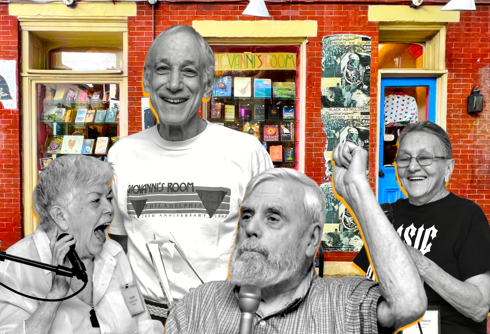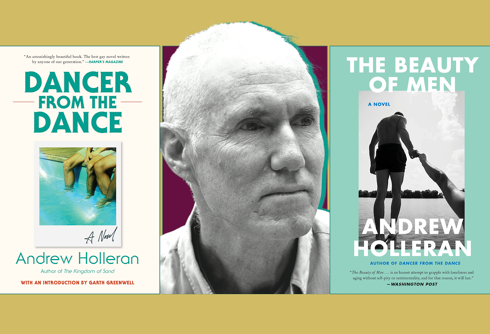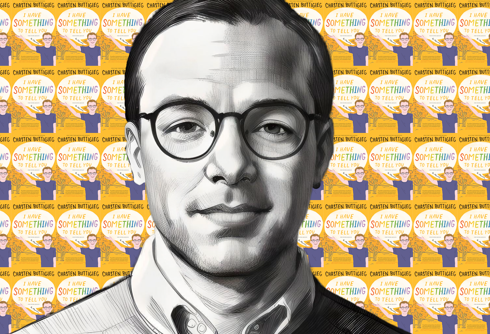It’s one of those frigid and gray wintry days where the slush builds up in the streets, and the wind buffs snow drifts into a hard sheen. Amy Schneider hasn’t transitioned yet, so she’s masc-presenting when it happens. The woman seems to come from nowhere, knocking on the passenger-side window and asking if she can get in to warm up. Schneider, flustered, mutters, “Oh, um, sure, I guess?”
The stranger, starving, climbs in and almost immediately asks if Schneider can buy her a meal. The future Jeopardy! champion concedes, feeling awkward, wondering where this is headed. She has an inkling of what this woman does for a living, but it isn’t confirmed until the stranger, a sex worker, touches Schneider’s knee and offers “a date.”
With over 1,900 library book titles targeted for censorship in the U.S. this year, these revealing moments in Schneider’s new memoir, In the Form of a Question: The Joys and Rewards of a Curious Life, read like an act of rebellion.

Never Miss a Beat
Subscribe to our newsletter to stay ahead of the latest LGBTQ+ political news and insights.
Related:
Amy Schneider blasts New York Times’ anti-transgender coverage as the paper defends JK Rowling
“I just get so tired of being told that my health and safety count less than cis people’s, because I’m weird and different, unlike normal innocent cis people.”
The former software engineer gained notoriety through her trivia prowess on Jeopardy!, racking up an astonishing $1.6 million and becoming the most successful woman ever to appear on the game show. But far from focusing on the minutiae of the competition, Schneider’s book widens the lens to reveal what’s becoming a dwindling commodity in the literary realm: trans joy.
As Schneider writes in the book, “Everything is a strand in the infinite tapestry of possible knowledge, and I want to explore as much of that tapestry as I can, in the pleasant knowledge that I will never, ever be done.” Accordingly, no topic in Schneider’s life is spared of scrutiny—the scandalous meets the mundane.
Amy Schneider spoke with LGBTQ Nation from her home in Oakland, California, to discuss her new memoir.
One thing that stood out to me in your memoir was how you cover a wide range of topics, but its sex-positivity particularly struck me. What propelled you to take such an approach?
One of the main reasons was just how harmed I feel by the sexual Catholic shame or whatever that I was raised with. Developing beyond that has just been really important in my life and is, therefore, an important part of my story. Beyond that, a lot of trans people have had more exciting sex lives than many cis people. And that’s something that can be used to shame trans people or treat them as deviant or whatever. So it was just important for me to show that part of my life and I’m also a Jeopardy! champion that’s very smart and successful.
Right. You’re challenging expectations. Jeopardy! has this sheen of middle-American wholesomeness. So I can only imagine some old ladies who are fans of the show picking up your book and thinking, “Oh my word! The word ‘boner’ is in here!”
I wonder that as well, for sure. But you know, ultimately, I hope to reach more than just Jeopardy! fans. I’m kind of counting on it because I didn’t really put that much about Jeopardy! in there. I would imagine that, to some extent, the Jeopardy! demographic isn’t going to be thrilled about it. But I hope that that’ll be the minority response.
“A lot of trans people have had more exciting sex lives than many cis people. And that’s something that can be used to shame trans people or treat them as deviant or whatever. So it was just important for me to show that part of my life.”
Amy Schneider
Who is the target audience?
I think it is — to some extent — that Jeopardy! audience because even if they’re upset by it, I want to show them the complicatedness of my story. And I certainly want other trans people to read it. One of the things I was thinking about is, like, of the things I’ve learned about transness, what are the things I wish the most that somebody had told me before? So, I’m just trying to capture that story. Beyond that, I’m trying to reach people who don’t know much about trans people to show that experience from the inside because it’s not intuitive necessarily. It’s kind of a weird thing, being trans; you kind of have to go through it to really get it, to an extent.
Absolutely. As a fellow trans woman, I understand that. And you strike a fine balance of capturing the universal elements of the trans experience and your more personal elements. Since you’re laying it so bare, you even discourage younger readers from going farther than the introduction. What went into that decision?
Right. I’m writing about some really sensitive subject matter. But there are plans in the works to make essentially a middle-grade version of this book with the parts that are appropriate. That is still a plan. One of the things I decided — not even in terms of writing the book but when I wanna speak about transition in general — was that I needed to focus on what I know for myself, from my own experiences. Because that’s always something I can stand behind. If I’m making general statements, I get out over my skis. As long as I stick to that, I can feel OK with it.

You cover a lot of controversial topics in this book, but perhaps the most revealing is when you’re talking about drugs. What is your stance on drugs, and why did you include that information?
I decided to, in part, because it is, again, a part of a lot of trans peoples’ lives at some point or another. And also, the “war on drugs” mentality and the “sex-negative” mentality — as you know — come out of the same place. And I think they’re both harmful. I think I was just focused on showing that drugs have been a part of my life, and I don’t think that’s a problem, and I’m kind of happy, in a lot of ways, that they have been.
That isn’t to say that there aren’t a lot of complicated aspects to that question when it comes to public policy and things like that. And, like, drugs do cause harm; people are harmed by them. But I was just focusing on, again, my experience: that they’re fine. And decriminalization attempts have flopped … our current policy seems to be bad. I don’t know what the ideal policy could be regarding sex work, but whatever ours is, this isn’t it.
There’s an element of destigmatization in almost every chapter. You’re destigmatizing transness, you’re destigmatizing drug use, you’re destigmatizing — even when you’re talking about losing your virginity — an experience with a sex worker. You manage to make the “character” of the sex worker with whom you lose your virginity feel very human and easy to empathize with.
That’s something that, like, beyond that chapter — and I didn’t get into as much — but sex work is something I actually do feel pretty passionate about in terms of decriminalization and just respect.
Can you elaborate on that?
I just think that there’s nothing inherently wrong with it. Like, you know, it can be exploitative, but so can every type of work. And I think that, again, the scaremongering about human trafficking is awful. Like, a lot of people who are trafficked are trafficked to work in the textile industry, but it’s still legal to sell clothes. And I think that if prostitution had never been criminalized, then it wouldn’t be obvious why it should be.
There’s this beautiful quote from your book where you write, “Onstage, you can get away with anything. You can do the very things that frighten you the most, and not only can you survive them, but you can enjoy them.” In addition to covering taboo subjects, you also wax fondly on your love of performance. And when you’re talking about gearing up for Jeopardy!, you discuss your performance of gender. Can you touch on that?
For one thing, it was a year between when I was originally told I’d be on Jeopardy! and when the taping happened, and my thinking about it definitely evolved over that year. You know, every year further into transition is a different relationship to it. But basically, the thing that I was still most dysphoric about was my voice. I didn’t like hearing it. I still don’t love getting “Sir” on the phone and that sort of thing. And so it was something that I felt like, I’m gonna be OK with how I look — I was getting my professional hair and makeup done — and I’d use a more feminine voice. I worried that I was going to sound like a boy and everybody was going to notice and laugh at me or something if I didn’t do that.
But as taping got closer, it all of a sudden, unexpectedly, felt wrong and dishonest and just not the right thing for me in ways that I couldn’t fully articulate to myself at the time. And I think it was only afterward, in retrospect, that I saw that at least part of the reason was just that I didn’t want to show I’m ashamed of being trans. I’m not ashamed. And if elements of my transness show through, you know, OK, I’m trans. I’m happy about it. There are aspects of me that aren’t 100% passable, and I’m OK with that in a way that I first started transitioning; I never thought I would be.
“Onstage, you can get away with anything. You can do the very things that frighten you the most, and not only can you survive them, but you can enjoy them.”
Amy Schneider, In the Form of a Question
We’ve seen a wave of book bannings and even book burnings nationwide. Some people might want to ban your book because of its content. What would be your response?
I honestly don’t know. It’s a position that I don’t easily understand. Like, I guess I’d say, “Let me think.” I’d say this is the First Amendment, and this is just my story. And I’m not, like, making anybody do anything that I talk about here. You know, it’s a free country whether or not you get into defending if it’s a morally good book or not. Let the market decide. Let our free society decide how to deal with it.
The interview has been edited for length and clarity.
Don't forget to share:
















